Author: SK Arora Source: cointelegraph Translation: Shan Ou Ba, Golden Finance
Key Takeaways
ChatGPT can simplify complex crypto projects by summarizing white papers, explaining use cases, and analyzing token economics.
Before investing in any crypto token, it is crucial to research the team, partners, and security risks.
Comparing a project with competitors can highlight its strengths and weaknesses, helping you make better decisions.
ChatGPT can provide relevant research questions for both beginners and experienced investors, acting as a research guide. Investing in cryptocurrency can be both exciting and overwhelming, especially with thousands of tokens to choose from these days. From Bitcoin and Ethereum to lesser-known altcoins and meme coins, the market is rife with opportunities and risks. Proper research is essential before committing funds. That's where ChatGPT can help. This article will show you how to use ChatGPT to research crypto projects (using examples from different projects), assess their credibility, and make more informed, data-driven investment decisions. Whether you're a beginner looking to streamline your workflow or an experienced trader, ChatGPT can be a powerful research assistant. Why Research is Crucial in Crypto Investing Unlike traditional stocks, which are backed by financial reports and regulatory filings, crypto assets often lack standardized financial data. You need to sift through whitepapers, GitHub repositories, community sentiment, and more. Failure to conduct proper research can lead to investing in overhyped or even fraudulent projects. Crypto scams come in many forms, and here are some common examples that illustrate why research is so important: Rug pulls: Developers create a new token, hype it up to attract investors, then abruptly withdraw all funds, leaving investors with worthless tokens. The 2021 "Squid Game" token is a notorious example of this, as its price skyrocketed before its creators absconded with millions. Pump-and-dumps: A group of people artificially inflate a token's price by spreading false hype, then sell their holdings for a profit, causing the price to plummet and others to suffer losses. Fake projects or plagiarized white papers: Some token white papers are copied from legitimate projects or contain vague technical jargon to mask their lack of actual products or teams. "Pig-killing schemes": Scammers build long-term relationships to gain trust, then convince victims to invest heavily in fake crypto projects, ultimately stealing their funds. Deepfake scams: Sophisticated AI-generated videos or audio impersonates influencers or company executives to trick people into sending cryptocurrency or revealing their private keys. Domain name squatting: Scammers register domain names similar to those of legitimate crypto projects or exchanges to mislead users and steal credentials or funds.
Phishing and Fake Websites: Scammers create websites that mimic popular tokens or exchanges in order to steal private keys and funds.
Therefore, before investing in any token, it is crucial to verify the following basic points:
What does the project do?
Who is behind the project?
What problem does it solve?
Does it have a working product?
How is it different from its competitors?
ChatGPT can help you answer all these questions faster and more clearly.
Step-by-Step Guide: How to Research Crypto Projects Using ChatGPT
Here’s an effective way to use ChatGPT to research tokens before investing:
1. Start with a Project Summary
Use ChatGPT to generate a high-level overview of any token. This can help you quickly understand the project’s purpose and goals.
Sample prompt:
"Explain in simple terms what Bitcoin Hyperman (HYPER) does."
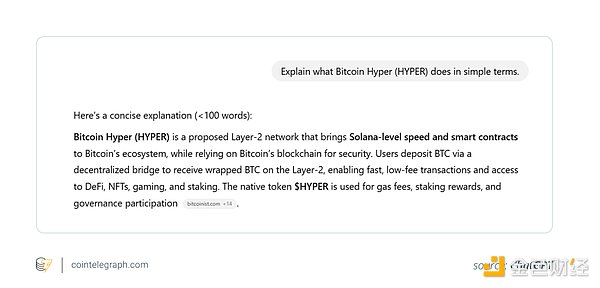
2. Get a summary of the white paper
White papers are foundational documents that outline a crypto project's technology and roadmap. They can be highly technical and difficult to understand. You can paste the whitepaper into ChatGPT and have it scan or summarize it and provide you with a readable version, saving time and maintaining clarity. Example prompt:
“Summarize the key points of the Stellar whitepaper.” 3. Check for use case and market fit Many tokens promise innovation, but do they solve real-world problems? You can let ChatGPT help you evaluate a token's utility.
Sample prompt:
"What problem does Chainlink solve, and who is using it?"
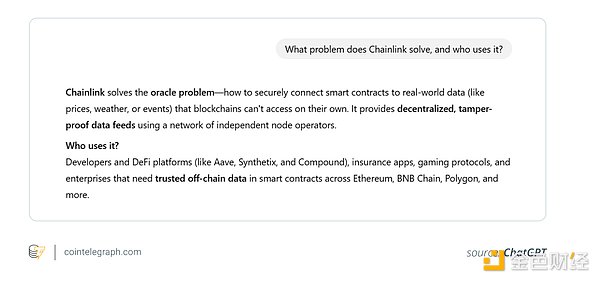
4. Evaluate the team and partners
A credible founding team and strong partnerships often indicate a project's legitimacy and execution potential.
Sample prompt:
"Who founded the Avalanche blockchain, and what is their background?"
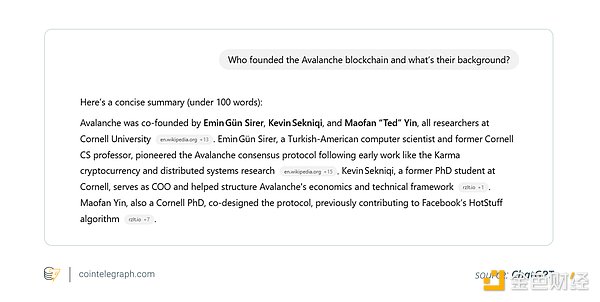
5. Analyze Token Economics
Token economics refers to the token's supply, incentives, and distribution structure. Poor token economics often lead to inflation, pump-and-dump schemes, or price crashes.
Sample prompt:
"Explain the token economics of Hedera (HBAR). What is its total supply and how is it distributed?"
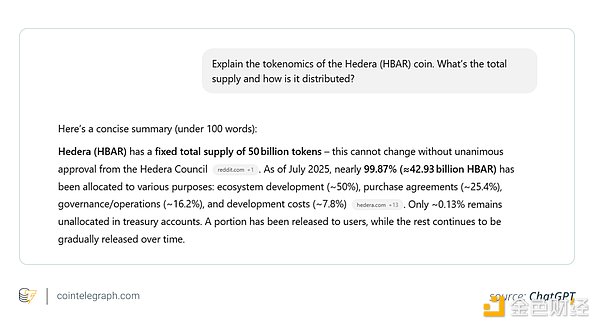
6. Check for compliance and security issuesSecurity and regulatory issues can derail even the most promising crypto projects. You can ask ChatGPT about the risk factors.
Example prompt:
"Has Tether (USDT) faced any regulatory issues?"
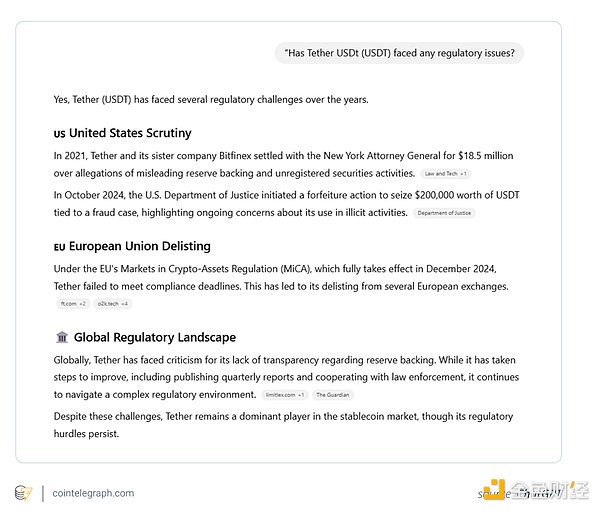
7. Comparison with competitors
Understanding how a token compares to other tokens in its category (DeFi, layer 1, NFT, oracle, etc.) can help you identify its strengths and weaknesses.
Sample prompt:
"Compare the Sui and Sei blockchains in terms of scalability and interoperability."
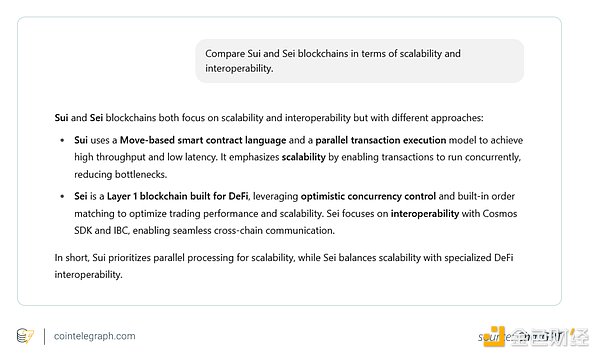
You can even request the pros and cons in a table format for easier analysis.
Bonus Tip: What to Ask ChatGPT
If you're new to crypto, you might not know what questions to ask. Try this:
Sample prompt:
"I'm considering investing in a new crypto token. What key points should I research or pay attention to?"
ChatGPT provides you with a checklist covering fundamentals, technicals, market sentiment, and security, perfect for building your own research framework.
What ChatGPT Can't Do (Yet)
While ChatGPT is a powerful research assistant, it's important to understand its limitations:
It doesn't have real-time data unless integrated with tools like web browsing or APIs.
It doesn't provide investment advice or guaranteed predictions.
While ChatGPT is a powerful research assistant, it's important to understand its limitations:
It doesn't have real-time data unless integrated with tools like web browsing or APIs.
It doesn't provide investment advice or guaranteed predictions.
It may generate outdated or incorrect information (always verify the facts).
Whether you’re investing $10 or $10,000, conducting thorough and careful research remains your best line of defense against risk. Fortunately, AI tools like ChatGPT now make it easier than ever to gather insights, organize information, and ask the right questions.
It’s crucial to use ChatGPT as a supplement to your research process, not a replacement for your critical thinking and due diligence.
 Weatherly
Weatherly










